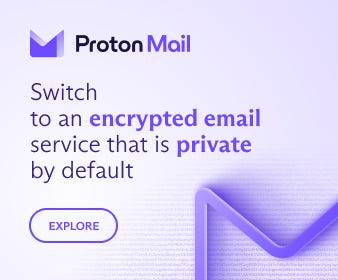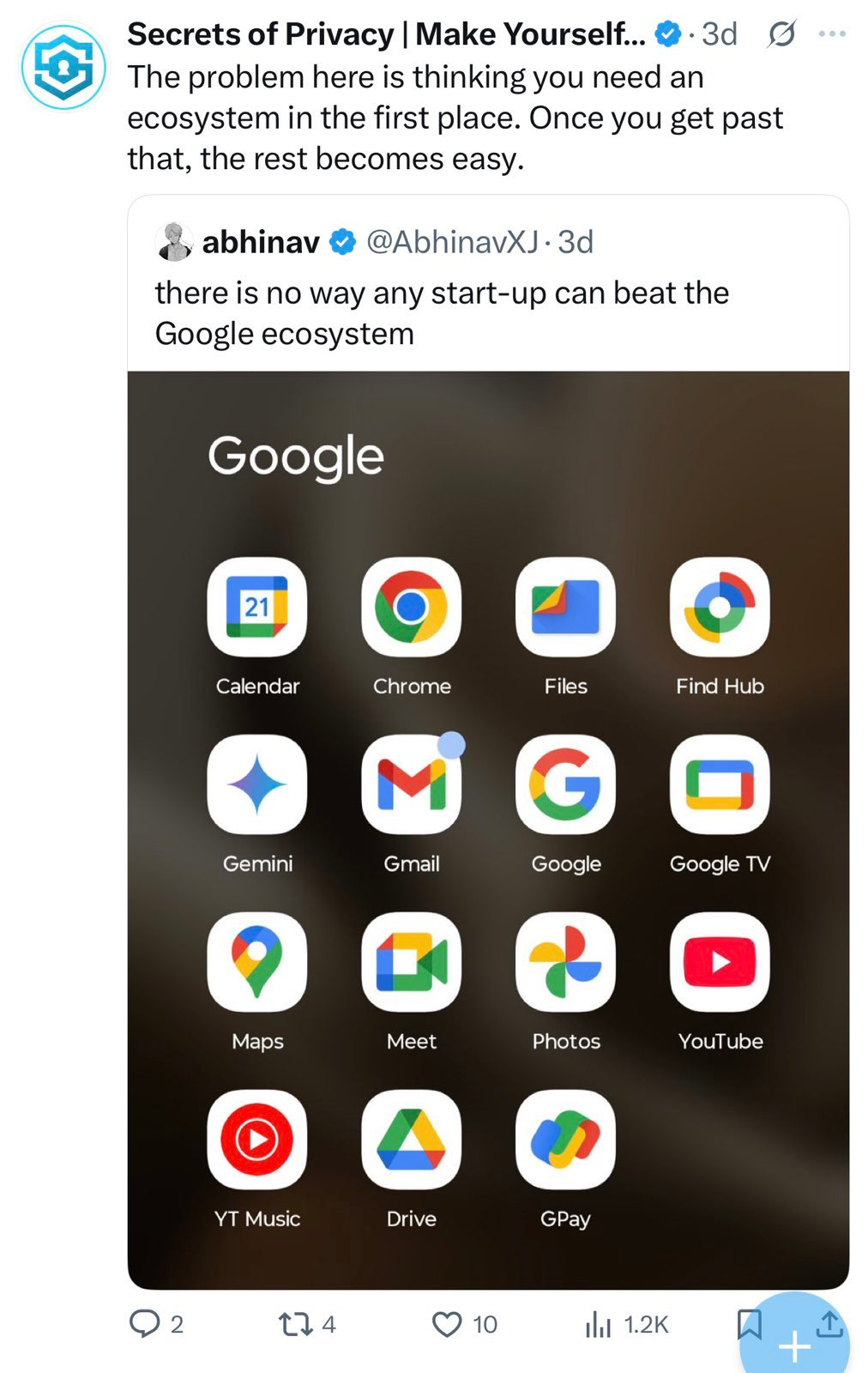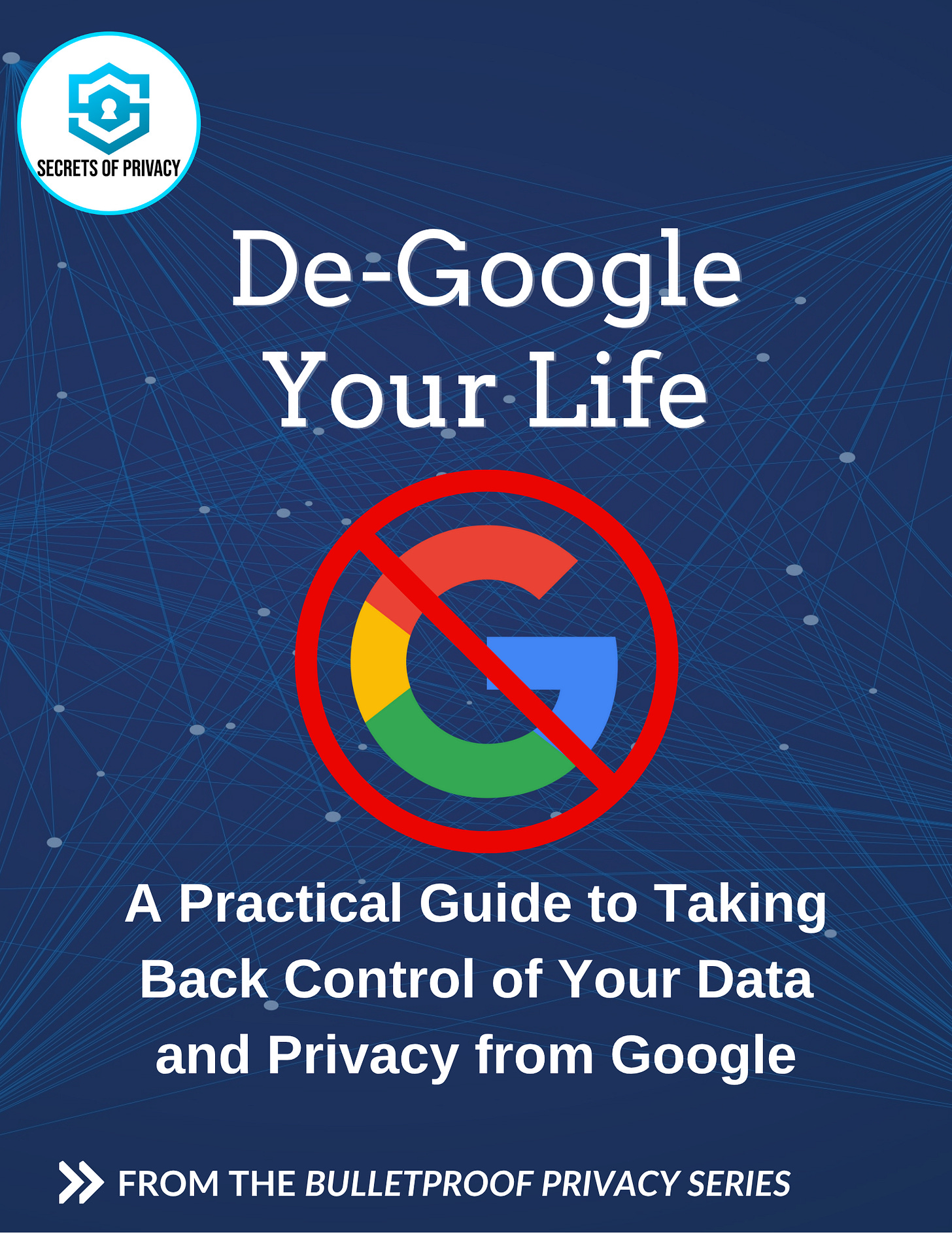The Real Winner of “Ecosystems”? Big Tech, Not You
Stop paying the convenience tax with your data: smarter swaps that stick
A viral post on X claimed last week no start-up can beat the Google ecosystem. It’s a common take we’ve seen before.
Here’s the flaw in that thinking though: individuals don’t need an ecosystem. Ecosystems are how Big Tech entraps you into staying with their services. They bundle everything so switching feels costly. It even can create a FOMO effect that is highly effective.
Yes, there are small benefits to keeping mail and calendar under one roof (we discuss this below). But the bundle mostly serves the platform, not you. Today’s privacy-smart path is simple: mix and match the best-in-class tools, keep your data surface smaller, and still get your work done.
What Ecosystem Lock-in Really Is
Ecosystems aren’t just “everything works together.” They’re a business model that raises your switching costs so you stay put. The bundle (mail, calendar, maps, photos, cloud, payments, browser, phone) is engineered to feel effortless inside and inconvenient outside. That’s lock-in.
How platforms create the lock
Shared identity: One login ties every product together. Lose it or try to move it, and ten other things break.
Default nudges: The browser opens the company’s search, the phone prefers the company’s apps, links deep-open into the company’s store.
Data gravity: Photos, contacts, messages, and docs pile up. The bigger the pile, the heavier it feels to move.
Exclusive glue: “Works best with X” features, like quick share to Drive, instant calendar invites, one-tap pay.
Social pressure: Teams and families normalize the same tools, so leaving feels like you’re creating friction for others.
Why lock-in matters for privacy
Total profile view: When one company sees your mail, locations, searches, videos, files, and purchases, it can connect the dots better than anyone.
Bigger blast radius: One account compromise or policy change now touches most of your digital life.
Less leverage: If moving is painful, you tolerate more tracking and more “product experiments” you didn’t ask for.
Our stance has always been practical: you don’t need to go off-grid to protect your privacy. The less data you leak to any single company, the harder you are to target. Relying a digital ecosystem undermines this whole way of thinking.
Quick self-check: signs you’re locked in
If losing access to one login would strand your calendar, files, photos, and payments.
If “Sign in with [Big Tech]” powers most of your third-party accounts.
If you can’t imagine maps, search, or photos working outside the default bundle.
If exporting your data sounds scary or unfamiliar.
The antidote: unbundle on your terms
The goal is never perfection (which is not attainable). Keep the parts that truly benefit from being together, and mix-and-match the rest. Treat mail + calendar as your spine (more on that next), then choose unrelated, best-in-class tools for browsing, search, storage, notes, and photos. You keep convenience, cut correlation, and reduce single-point-of-failure risk.
Think of it like financial diversification for your data. Spread your exposure so one company (or one breach or one data harvester) can’t see or affect everything. That’s how you become a harder target without breaking your workflow.
Mail and Calendar: The One Bundle That Still Makes Sense
For most people, mail and calendar work better when they live under the same roof. They share the same identity, contacts, and time-zones, and they’re the two apps you touch all day. Keeping them together reduces friction without surrendering your whole life to a single ecosystem.
The good news: you don’t need Google for this. There are dozens (easily 50+) combinations that pair email + calendar cleanly, ranging from niche privacy friendly startups to Big Tech incumbents. Examples include Proton, Tuta, and Fastmail on the one hand and Outlook, Apple, and your ISP on the other.
Note: we’re not endorsing using Outlook, Apple mail or your ISP for mail and calendar. Our point is that “ecosystems” are overrated in importance when viewed from an end user. You have a lot of choices beyond Google.
Think of mail + calendar as your operating spine. Choose one provider you trust, then connect everything else (notes, storage, tasks, video, etc.) around it on your terms.
Proton: A Privacy-First Ecosystem That Seeks to Rival Google
If you do want a more unified setup without the surveillance trade-offs, Proton is the closest thing to a privacy-friendly alternative to Google. Their model is simple: pay them money, not with your data. Their suite now covers the daily basics:
Proton Mail and Proton Calendar for communication and events
Proton Drive for files and photo storage
Proton Pass for passwords and passkeys
Proton VPN for encrypted connections on the go
Proton Docs for word processing

Is Proton an “ecosystem”? Technically yes, but the incentives are different. It’s built on encryption and portability, so you can still mix and match: keep Proton for mail/calendar and drive, use Brave or Mullvad for browsing, Brave or DuckDuckGo for search, Notes Nook for notes, and watch YouTube in a separate browser profile. You get most of the convenience of a bundle without the lock-in pressure or the data-harvesting business model.
Bottom line: if you want one vendor to anchor your privacy setup, Proton is a strong option. If you prefer to mix tools, Proton still plays nicely as the mail/calendar backbone while you choose apps elsewhere.
Need a Plan to Ditch the Google Ecosystem?
Most “de-Google” posts and free online guides are either zealotry (“dump everything today”) or vague lists that leave you stuck.
We created a guide from the ground up that is different because it’s built for busy professionals who want results without breaking their workflow. It’s vendor-agnostic, mixes convenience with control, and gives you clear pacing plans, like what to change now, what to phase later, and what to leave alone.
No scare tactics. No high and mighty privacy-influencer lectures. Just a sane path that keeps your calendar humming, your files intact, and your stress low.
👉 De-Google Your Life: practical steps, clean checklists, and real privacy wins. Use coupon code 9CYD9J0 for 20% off (click here).
Friendly Ask
If you found this helpful or informative, chances are your friends and family will as well. Please share it with them to help spread awareness.
Looking for help with a privacy issue or privacy concern? Chances are we’ve covered it already or will soon. Follow us on X and LinkedIn for updates on this topic and other internet privacy related topics.
Disclaimer: None of the above is to be deemed legal advice of any kind. These are *opinions* written by a privacy and tech attorney with years of working for, with and against Big Tech and Big Data. And this post is for informational purposes only and is not intended for use in furtherance of any unlawful activity. This post may also contain affiliate links, which means that at no additional cost to you, we earn a commission if you click through and make a purchase.

Privacy freedom is more affordable than you think. We tackle the top Big Tech digital services and price out privacy friendly competitors here. The results may surprise you.
Learn how email tracking pixels work, what data they reveal, and the best ways to block them to protect your inbox privacy.
If you’re reading this but haven’t yet signed up, join for free (3.6K+ subscribers strong) and get our newsletter delivered to your inbox by subscribing here 👇





This article nicely describes why big tech companies spend so many resources to lock you in their environment!
But I am guilty as charged. I use everything from Apple.
Yes, you're correct, these 'systems' are also a trap.
In order to publish my book on Kindle, Amazon required a website, a limited company, and also Word. Pricey? Sure.
The website I set up did less than nothing for my book. So I tried another, and then dropped that one as well.
The company was not considered. So the last hurdle was Word. Now begins the battle of the century. MS tried to sell me 365 but that programme precludes me from publishing and selling my work. So I opted for the massively priced professional product which contains all the different bits. When MS try to force 365 on me I ask for a refund in the professional package. This stops for a little while, then...
My package must be purchased every time a new computer is bought. Did I say this was pricey?
But, the book was completed and sent to the publishers for world wide distribution.
Now, my diary is a Filofax handwritten one. Good luck to the hackers! My calendar is a Filofax. My notes are Filofax...
Yes, we can be distressed by the hackers but I am becoming more and more off-line as I no longer trust msm or the 'stories' that creep up to trap us.
Your work in this time is valuable. Keep on enjoying what you are doing.